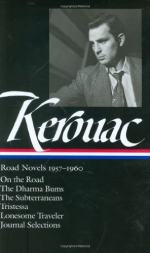|
|
On the Road Author/Context
Jack Kerouac, originally Jean-Louis Lebris de Kerouac, was born on March 12, 1922 to French Canadian parents in Lowell, Massachusetts. His first language was a French-Canadian dialect and even by the age of eighteen, his English was described as "halting." His older brother died when he was four years old and this affected him his entire life. He went to Columbia University on a football scholarship, but dropped out and joined the Merchant Marines. He was married three times, but lived with his mother most of his life. He died in Florida in 1969 at the young age of 47.
Kerouac is best known as the father of the Beat movement. He met fellow author Allen Ginsberg when he was first in New York. With Ginsberg, his friend Neal Cassady, the person on whom Dean Moriarty is based, and heroin-addict/writer William Burroughs, Kerouac formed the nucleus of a group of writers that defined an era. This group experimented with drugs, eastern mysticism, and sexual deviation. A few of them were involved in Timothy Leary's LSD experiments. Ginsberg's poem, "Howl", and Burrough's novel, Naked Lunch, have become cult classics, canonized in American literature by many critics. This group heavily influenced the drug culture of the sixties and seventies, and literary circles to the current day. The group philosophy, although never officially declared, involved experimentation with drugs and integrating these experiments into writing and intellectualism. Along with this, they embraced the American jazz subculture and helped to make it more mainstream.
Kerouac's first novel, The Town and the City, was published to mediocre reviews in 1950. For the next few years, Kerouac attempted to finish a book about his adventures on the road, but he was never successful. In April 1951, Kerouac wrote for three weeks on a continuous roll of paper and finished the first complete version of On the Road. When the book was finally published in 1957, Kerouac became an instant celebrity.
Many of Kerouac's years before and after On the Road were spent either actually on the road or at home writing. Among his peers, he was famous as a jazz poet, although many modern critics agree with Lawrence Ferlinghetti, who contends he was "a better novel writer than a poem maker." After his second novel, Kerouac's literary career was affected by his frustration in trying to cope with his new fame and match his original success. Kerouac wrote many novels, most of which were meant to be part of what he called "The Duluoz Legend," the story of his life spread out through several novels. Other novels not part of this sequence are The Subterraneans and The Dharma Bums. He died before he could complete his legend, however, and On the Road endures as his most significant work.
According to Ann Charters, "On the Road can be read as an American classic along with Mark Twain's Huckleberry Finn and F. Scott Fitzgerald's The Great Gatsby as a novel that explores the theme of personal freedom and challenges the promise of the 'American dream.'" Kerouac's most successful novel stands as a testament to a period of American history and an intellectual movement that would otherwise be left unexplained. Although not wholly autobiographical, it provides an insight into a time that has past. Omar Swartz suggests that "the idealistic message of Kerouac's fantasy is a counterstatement to the negativism and corruption of the corporate fantasy that America disseminates."
Bibliography
Clark, Tom. Jack Kerouac. New York: Harcourt Brace Jovanovich, 1984.
French, Warren. Jack Kerouac. Boston, Twayne Publishers, 1986.
Gifford, Barry and Lee, Lawrence. Jack's Book. New York: St Martin's Press, 1971.
Kerouac, Jack. On the Road. New York: Penguin Books, 1956.
Swartz, Omar. The View from On the Road. Carbondale, Southern Illinois University Press, 1999.




